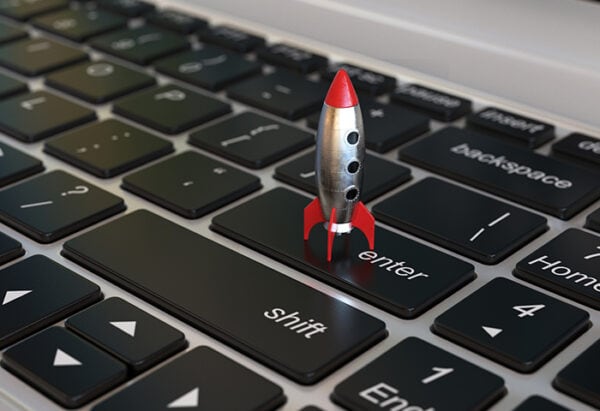Nothing is worse than a slow laptop when you need it most. A slow laptop can quickly throw you off track, whether you’re working on an important project, attending an online meeting, or watching your favorite show. The good news is that you don’t always have to buy a new computer. With just a few simple steps, you can speed up your laptop and make it run better.
This guide shows you how to effectively speed up your laptop. These methods are easy enough for anyone to try and work effectively, ranging from uninstalling unnecessary programs to upgrading hardware, all with noticeable results.
Clean up unnecessary files and programs
Over time, your laptop becomes cluttered with temporary files, unused software, and background processes. These things can’t be saved and can slow down your computer.
First, uninstall all unnecessary applications. Go to the Control Panel (Windows) or the Applications section (Mac) to remove unnecessary applications. Next, use built-in tools, such as Disk Cleanup in Windows or Storage Management on Mac, to clear out temporary files.
You can also use third-party cleaners, but be careful and only use software you trust. This simple cleanup often makes your laptop run faster, and it won’t cost you a cent.
Limit startup programs
A large number of startup programs running in the background is a major cause of slow startup times. These programs launch automatically, draining memory and battery power before you even start working.
Windows has a tool called Task Manager that lets you control which programs run at startup. On a Mac, go to System Preferences and view your login items. Prevent unnecessary programs from launching at startup.
Removing some startup programs can make your laptop boot and run faster.
It’s important to keep your software and operating system up to date
Updates can be inconvenient, but they’re essential for keeping your computer running smoothly. System updates often include security improvements, bug fixes, and speed improvements.
Check that your work system is up to date. Also, make sure that important programs like your browser, drivers, and work apps are up to date. This not only speeds up your device but also prevents malware and other problems that can slow it down.
Manage browser tabs and plugins
If your laptop slows down while browsing, your browser might be the problem. Opening too many tabs or large plugins can quickly drain memory.
Reduce the number of open tabs. Take notes on multiple pages and save them for later with a storage tool or an app that supports “read later.” Also, check your browser plugins and remove or disable any you don’t use often.
If you spend most of your time online, reducing the number of browser tabs can make your laptop run faster.
Manage your tasks to free up memory
Random access memory (RAM) is crucial for multitasking. If your laptop runs slow when you have many apps open, you may not have enough RAM.
To see which Windows apps are using the most memory, open Task Manager and look at the list. Use Activity Monitor on a Mac. Close unnecessary apps to free up space for the apps you do need.
If this problem persists, you may need to upgrade your RAM. Upgrading your laptop’s memory is one of the best ways to improve performance.
Replace your solid-state drive (SSD)
Replacing your laptop with a solid-state drive (SSD) instead of an older hard drive (HDD) can make a huge difference. SSDs are faster, allowing your laptop to boot faster, load applications faster, and multitask more efficiently.
While SSDs aren’t expensive, replacing them is often cheaper than buying a whole new laptop, and you’ll see the speed improvement immediately.
Detect and remove viruses and malware
Malware and viruses not only threaten your security but also slow down your computer. Strange applications running in the background can slow down your computer and consume significant resources.
Use a reliable security tool to perform a thorough scan. Most current security software can also identify PUPs (potentially annoying programs) that take up too many system resources.
Securing your laptop not only protects your data but also makes your laptop run more smoothly.
Change your power settings
If dust accumulates on your laptop, it can overheat, slowing down the system to prevent damage. When components overheat, their performance decreases and their lifespan is shortened.
Clean the fans and keys regularly. Open your laptop when you feel safe to do so and carefully clean the internal fans. Using your laptop on a hard surface (not on a bed or sofa) also promotes air circulation.
When you need a new laptop
Even after taking all these measures, your laptop may still experience problems. If your device is older than 6-7 years and hasn’t been updated with newer technology, you may want to consider a new computer. Newer computers have better processors, faster storage, and improved power management, saving you time and effort.
Frequently asked questions about speeding up your laptop
Question 1: Why is my laptop suddenly so slow?
Malware, poor hard drive performance, or too many tasks running in the background can all cause your computer to suddenly slow down. A recommended first step is to run a security scan and check your system resources.
Do you know how often I should clean files on my laptop? To keep your system running smoothly, you should delete temporary files and unused applications every few months.
Q3: Will increasing RAM actually make my computer faster?
Yes. Upgrading your RAM can make switching between tasks easier and improve your computer’s overall speed, especially if you have many programs open at once and often run out of memory.
Q4: Do you need professional help replacing a solid-state drive (SSD)?
Not always. Many SSDs come with instructions and installation packages. However, if you feel unsafe, you can have someone open your laptop.
What if I want to make my laptop faster? A hard reboot can indeed remove junk files, malware, and unnecessary files, making your laptop feel like new again. But make sure you back up your data beforehand.
In short
If your old laptop is slow, you don’t always have to replace it with a new one. Often, simple fixes, like freeing up storage space, reducing the number of apps running at startup, or replacing the SSD, can get your device running like new again. Regular physical and digital maintenance will keep your laptop running smoothly for a long time.
By following the simple steps in this guide, you can increase your laptop’s speed, get more done, and enjoy a better work experience without breaking the bank.

